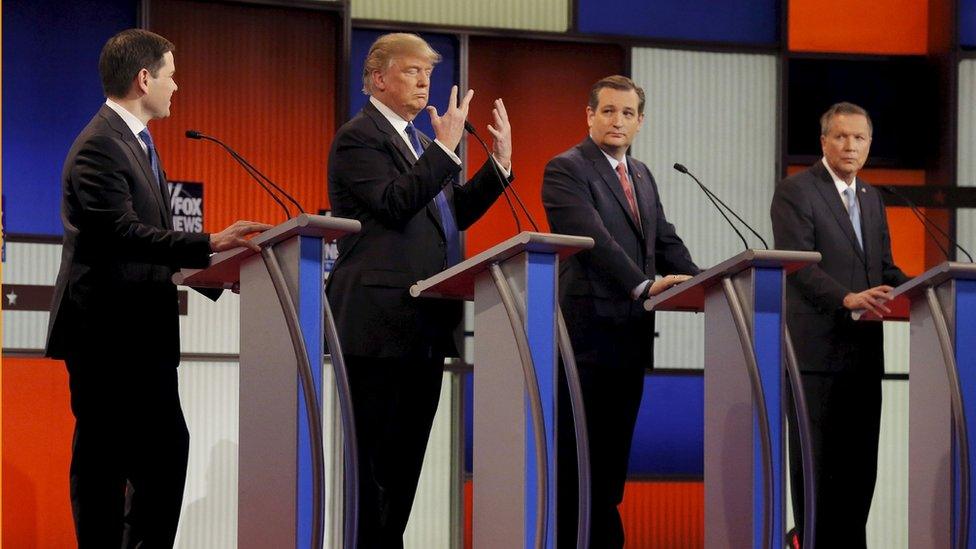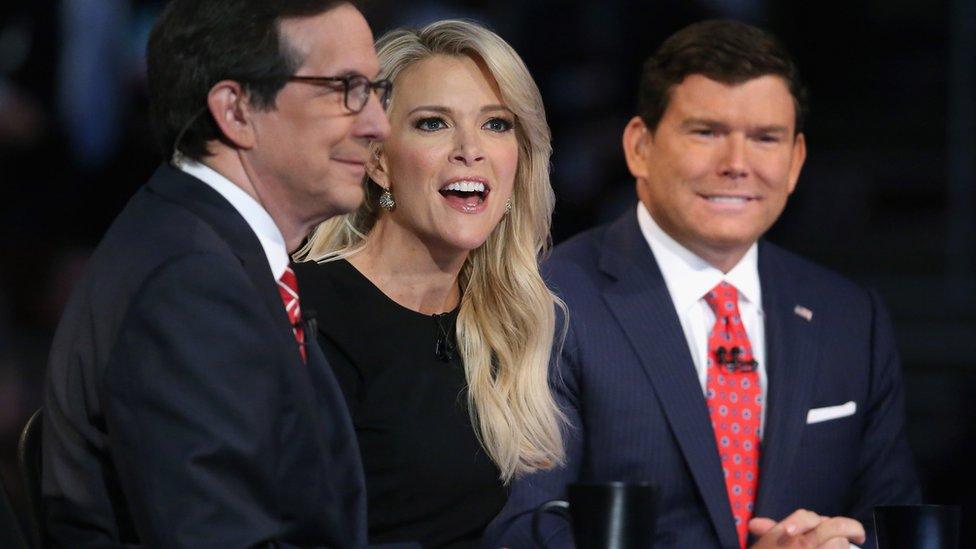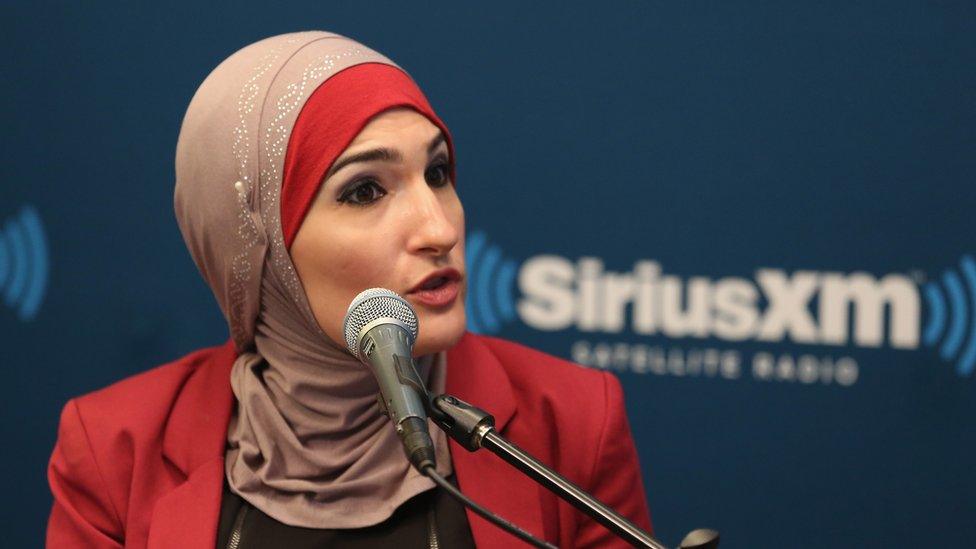Donald Trump and the 'X-rated' election
- Published

The 2016 presidential election has been filled with insults, sexual innuendo and just plain bizarre antics. Should children even be allowed to follow politics now?
Some parents found themselves in a strange spot while watching the most recent Republican debates with their young children - the moment when front-runner Donald Trump started talking about his hands.
Way back in the 1980s, a magazine printed that Trump was a "short-fingered vulgarian". Republican Marco Rubio resuscitated the insult at a campaign stop in Virginia after Trump repeatedly insulted Rubio's height.
"Have you seen his hands?" Rubio quipped. "You know what they say about men with small hands? You can't trust them."
Trump took up the "issue" in the most recent Fox debate, raising his hands for the audience.
"He referred to my hands - 'if they are small, something else must be small'. I guarantee you there is no problem. I guarantee," Trump said.
That made for an awkward viewing moment for Michele Liberton, a mom in Maple Shade, New Jersey, who wrote in a message to BBC News: "I watched with my 13 year old daughter last night. As soon as that comment was made I looked at her to see her reaction. She said 'Ewww. Is he talking about what I think he is talking about?'"
"My kids usually watch debates w/me. Not last night. I'm glad," wrote NBC politics reporter Tracie Potts on Twitter, external. "Didn't want to explain Trump's 'manhood'."

Fox anchor Megyn Kelly incurred Trump's wrath and insults after the first Republican debate
Even before last night's debate, plenty of parents have begun wondering if political debates - or any political coverage - is OK for young children in an election cycle that has included so many below-the-belt insults and general unpredictability.
Beyond the fact that candidates are increasingly using curse words, external, there have been moments like Trump's remark that Fox anchor Megyn Kelly had "blood coming out of her wherever", external when she grilled him at a debate, when he seemed to mock a reporter with a muscular disorder, or when candidates have tormented one another for sweating too much or having "wet pants", external.
"This is the first time I can ever remember actively thinking to myself whether I can comfortably watch the debate with my kids," says Steven Schlozman, a child psychiatrist and assistant professor of psychiatry at Harvard Medical School.
"There's no good template for how to talk to a 10 year old about why a presidential candidate just talked about the size of his member."
Schlozman says children understand the rudimentary concepts of elections as soon as they enter primary school, when there's likely a picture of the president somewhere in the building and they overhear teachers chatting about current events in the hall.
While he says he is always an advocate of watching political events on television with children, this presidential election has presented unique challenges since so much of what occurs on stage at a debate is counter to what we try to teach children about politeness, or the proper way to voice one's opinion.
"As parents we actually have to step in and say, 'I might agree or disagree with this politician, but it's not even about that,'" he says. "This is not the way for grown people to - or any people - to voice their disagreements."
Larry Kutner, a child psychologist and the author of six books about child development, isn't as concerned about the impact on younger children, and says instead debates can be used as a teaching tool for preteens and adolescents.
"One of the things that teenagers and preteens are fascinated by is being conned or being manipulated," he says. "If your child is watching this, watch it with them and point out, 'Oh, did you notice he didn't answer the question? They went to an emotional argument.'...Those kind of things will help them be more emotionally informed teenager."
Then there are parents like Linda Sarsour, the executive director of the Arab American Association of New York, who came home one day just after her 11-year-old daughter heard Rubio say, external that "the Palestinian Authority, which has strong links to terror, they teach little kids that it's a glorious thing to kill Jews".

Linda Sarsour has told other Muslim parents not to let their children watch the debates
"The fact that that's being said really hurts them," she says of her children. "That scares them because they don't know who they're referring to, and that could be them. The question is like, 'What happens if one of these is our president? What do we do?'"
Sarsour - the daughter of Palestinian immigrants - wishes her children wouldn't watch the debates and has advised other Muslim parents on her Facebook page to prevent their children from watching, at least when they're alone.
Schlozman agrees it's probably wise that kids like Sarsour's not watch alone, and that in general, parents may want to pre-screen any election coverage before watching it together. One of the worst things that can happen, he says, is if children see parents getting scared while watching election coverage.
"What they really need to do as best as possible is avoid showing their own panic. Kids can pick up on that in a heartbeat and I don't think it's time for that yet," he says. "You say to the kids, 'I know that it's scary and I acknowledge that, but I promise to tell you when I'm scared.'"
Simply banning debate viewing in the household likely won't work, says Kutner. If they don't see it at home, they'll hear about it at school or on social media.
"What you don't want to do is give the message to your child that these topics are off limits - we can't talk about it. Your child's going to have questions," he says. "For any of these topics - I don't care of if it's homophobic behaviour or racist behaviour or about income redistribution - you want your child to be able to question that and ask things that give them a model for how we should approach these kinds of complex issues."